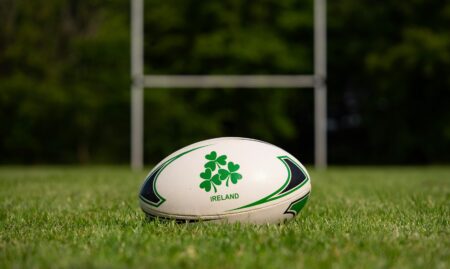13 November 2025
By Roger Kennedy
roger@TheCork.ie
How Community Sports Clubs Shape Regional Identity in Cork

Photo by Pablo Hsm: https://www.pexels.com/photo/ireland-clovers-on-rugby-ball-16566909/
Every parish in Cork has a GAA club. Some trace their history back over a century. The jerseys change, the facilities get better, but the connection between families and their local club stays the same. A man who wore the club colours in the 1960s watches his grandson do the same today. That’s just how it goes here.
The county splits itself between two sports. West of Bandon, football rules. Travel east past Cork city towards Midleton and you’ll find hurling country. The northside of the city produces hurlers who go on to play at the highest levels. This divide runs deep, and nobody questions it. West Cork people take pride in their football, and the hurling parishes guard their tradition just as fiercely.
Irish people have always loved competition. GAA matches pack out stadiums on summer Sundays, but entertainment takes different forms now. Casino sites available in Ireland attract people who want strategy, risk, and the rush that comes with both. The platform couldn’t be more different from a wet Sunday in February watching junior hurling, but the competitive instinct driving both is the same.
Cork clubs have serious records. Nemo Rangers won more All-Ireland Club Football Championships than any team in Ireland. St Finbarr’s claimed 25 Cork hurling titles over the decades. Blackrock took home three All-Ireland club crowns. When a club wins a county final, the whole parish celebrates. The pub stays packed for days. People who normally keep to themselves suddenly have plenty to discuss with their neighbours. That silverware belongs to everyone.
Big championship games bring serious money into Cork towns. Hotels book out weeks in advance. Restaurants can’t find tables. Pubs work flat out from lunchtime onwards. During the Jazz Festival weekend, Cork bars and restaurants took 17% more than the year before. GAA matches do the same thing, just with different crowds and different music.
Children who join clubs learn more than how to kick or strike a ball. They figure out teamwork. They deal with coaches who push them. They handle losing, which happens to everyone eventually. Very few make it to the county level, but that doesn’t matter. The lessons stick regardless. Parents meet on the sidelines, share flasks of tea, and watch their kids grow up in club colours. Those friendships often last longer than the playing careers.
Cork clubs own their own grounds in most cases. The pitches and clubhouses exist because communities fundraised for decades. Table quizzes, race nights, collections outside mass, whatever worked. The GAA’s structure puts decisions in local hands, so the parish controls what happens with their facilities. Clubhouses host committee meetings, birthday parties, and everything in between. They serve the community because the community built them.
These clubs persist because Cork people value what they represent. Volunteers turn up every year. Someone steps forward to coach the youngest teams. The fundraising continues without end, and so does the commitment. GAA clubs tie communities together in ways that statistics can’t capture but anyone can see. They’re woven into Cork’s identity, and that won’t change anytime soon.
